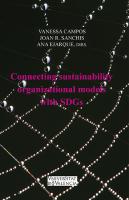
Connecting Sustainability Organizational Models with SDGs
Categorías
Palabras clave: Sustainable Development, Corporate Sustainability, Sustainable Development Goals, Sustainable Supply Chain Management, Economy for the Common Good
Publicado 31 marzo 2023
- Sinopsis
- Cómo citar
The scientific works have been divided into 10 chapters. Hence, each chapter deeper analyzes the conference’s main topic. Thus, focusing on the study of the social dimension of sustainability from the human resource management point of view, several studies analyze its influence on social performance, as well as its consideration when applying quality management principles and practices as a driver to the social dimension of the organization since these practices could lead to the development of a sustainable orientation. Additionally, it is also important to analyze how work-family conflict and professional stress among financial workers and their relationships levers to burnout syndrome. Another key point is the role of women in the economy as the performance of organizations has a great deal with gender diversity from its triple dimension (economic, social, and environmental). Moreover, based on the concept of Gender Equality presented in the United Nations’ Sustainable Development Goals, the gender-role perspective is strictly related to the ECG.
Cada uno de los 10 capítulos incluidos en este libro profundiza en el análisis del tema principal de la II Conferencia Internacional de Economía del Bien Común (2022). Así, centrándose en el estudio de la dimensión social de la sostenibilidad desde el punto de vista de la gestión de los recursos humanos, varios estudios analizan su influencia en el desempeño social, así como su consideración a la hora de aplicar los principios y las prácticas de gestión de la calidad como motor de la dimensión social de la organización, ya que estas prácticas podrían conducir al desarrollo de una orientación sostenible. Además, también es importante analizar cómo el conflicto trabajo-familia y el estrés profesional entre los trabajadores financieros y sus relaciones favorecen el síndrome de ‘burnout’. Otro punto clave es el papel de la mujer en la economía, ya que el rendimiento de las organizaciones tiene mucho que ver con la diversidad de género desde su triple dimensión (económica, social y ambiental). Además, con base en el concepto de igualdad de género presentado en los Objetivos de Desarrollo Sostenible de las Naciones Unidas, la perspectiva del rol de género está estrictamente relacionada con la economía del bien común.
